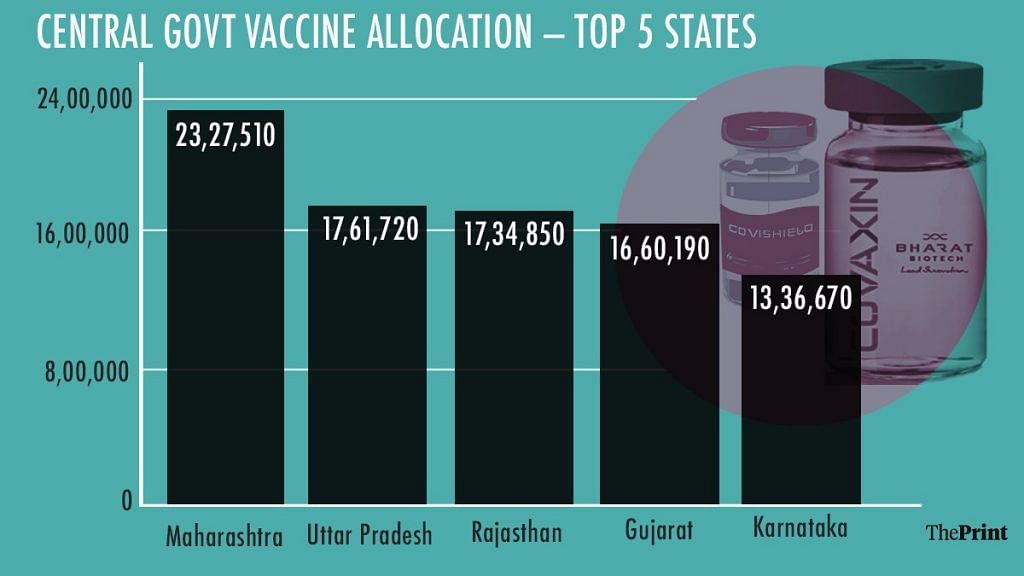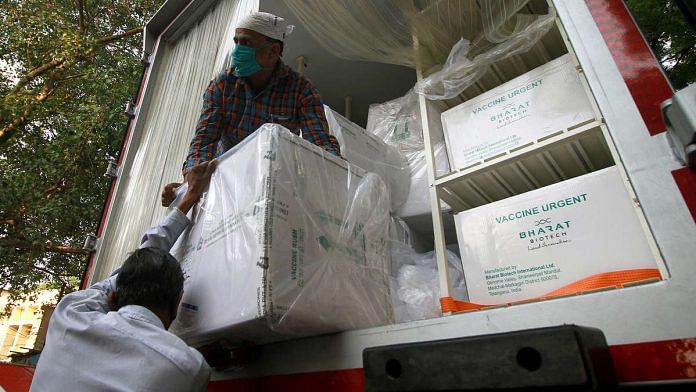New Delhi: For the first 15 days of May, the central government headed by Narendra Modi has allocated 2,12,50,000 doses of Covid-19 vaccines for the over-45 age group, while states and private hospitals have bought another 2 crore doses, the government told the Supreme Court in an affidavit.
From the central kitty, which includes 50 per cent of the total vaccine doses manufactured by Bharat Biotech and the Serum Institute of India (SII), the maximum number of doses were allocated to Maharashtra (23,27,510), followed by Uttar Pradesh (17,61,720) and Rajasthan (17,34,850).

The allocations are being made in proportion to a state’s active case load, the efficiency with which it has been running the vaccination programme, and how much a state has minimised wastage. Kerala, a high-burden state that has made sure that it reduces wastage to zero, received 9,09,500 disease of the vaccine.
This data is for vaccine doses to be administered to people over 45 years of age without any charge, and the Government of India has already asked states to prioritise the second dose over the first; last week, it set the target ratio at 70:30 for second doses over the first.
The government also told the apex court that between April and May, India added 59 crore additional Covid-19 vaccine beneficiaries (the 18-44 years population), following the launch of Phase 3 of the vaccination programme, known as the “liberalised and accelerated” phase.
Also read: Still playing the book-vaccine-slot game on CoWin? That’s because there’s a shortage of doses
States’ procurement — UP leads the way
In terms of Covid-19 vaccines procured directly from manufacturers, Uttar Pradesh has been the leader by a considerable margin, having bought 34,38,850 doses. Maharashtra is second with 18,60,730 doses, followed by Bihar (16,01,700) and West Bengal (14,24,400).
According to the guidelines laid down by the Government of India, both the vaccine manufacturers have to sell 50 per cent of their output to the Centre, while the other 50 per cent can be sold to state governments and private hospitals at pre-decided rates. Currently, Bharat Biotech’s Covaxin is available for Rs 400 a dose to state governments and Rs 1,200 to private hospitals, while SII’s Covishield costs states Rs 300 a dose and private hospitals Rs 600.
The figure for UP means it has procured about 15 per cent of the total vaccines available for procurement by state governments and private hospitals in the country. These vaccines can be administered as states deem fit.
With all states having announced free vaccinations for 18-44-year-olds, the doses procured in this way are mostly being used to inoculate this group. However, states are not at liberty to procure as much as they want — they can buy only in proportion to their population of this age group.
The government, in the affidavit, told the court that this time, it does not have the “luxury” to plan the vaccination programmes, like those in the past that were rolled out after much deliberation.
“It is submitted that though the states are procuring the vaccines from the manufacturers, the central government has, in consultation with the vaccine manufacturers, determined the pro-rata population of each state in the age group of 18-44, and each state will procure only that quantity, so that there is no disparity in availability of vaccines between the states inter-se either based upon difference in their bargaining power or otherwise. Each state is informed by the central government in writing about the number of vaccines it would receive for the month of May 2021, from the manufacturers which would be the figure of pro-rata number of the state’s population which belong to the 18-44 years age group,” the affidavit said.
The Centre also told the court that since all states have already announced that they will vaccinate 18-44-year-olds free of cost, effectively, India has free Covid-19 vaccinations for all adults. However, people who choose to go to a private facility to get vaccinated will have to pay a fee.
Also read: The reality of Modi govt’s vaccine funding: Rs 35,000 cr for states, zero for Centre
Govt in talks with Pfizer, Moderna
Delhi, which is currently locking horns with the Centre on the issue of vaccine allocation and procurement, has received 4,96,930 doses from the Centre for the vaccination of the 45+ age group, and has ordered a total of 3,60,530 doses for the vaccination of younger age groups.
The government also told the court that while this is the present status of vaccine availability, the situation may ease soon as it is in talks with foreign vaccine manufacturers to make their products available in India.
“It is submitted that against this approval from DCGI, Dr Reddy’s Laboratories has imported the first consignment of 1.5 lakh doses (of Russia’s Sputnik V vaccine),” the government stated.
“It is submitted that the central government is in active discussions with Pfizer, Moderna, J&J (Johnson & Johnson) and other vaccine developers/manufacturers outside India to facilitate their imports. It is submitted that if these efforts are successful, it will make more quantity of vaccines available for the country and thereby lead to increased pace of vaccination,” the government told the court.
The present policy, it said, ensures equitable distribution of vaccines to the population based upon age and vulnerability, takes care of the marginalised sections, and also takes care of equitable and rational distribution of vaccines among states.
It also put to rest concerns about vaccine pricing, saying: “By adopting consultative process and discussing at the highest possible level with the existing manufacturers of two vaccines, it is ensured that the pricing of vaccine is also not only reasonable but uniform throughout the country removing any possibility of one citizen in one state getting the vaccine at a higher price as compared to a similarly situated resident residing in another state.”
(Edited by Shreyas Sharma)
Also read: Young India wants Covid vaccines, but CoWIN just won’t let us win



